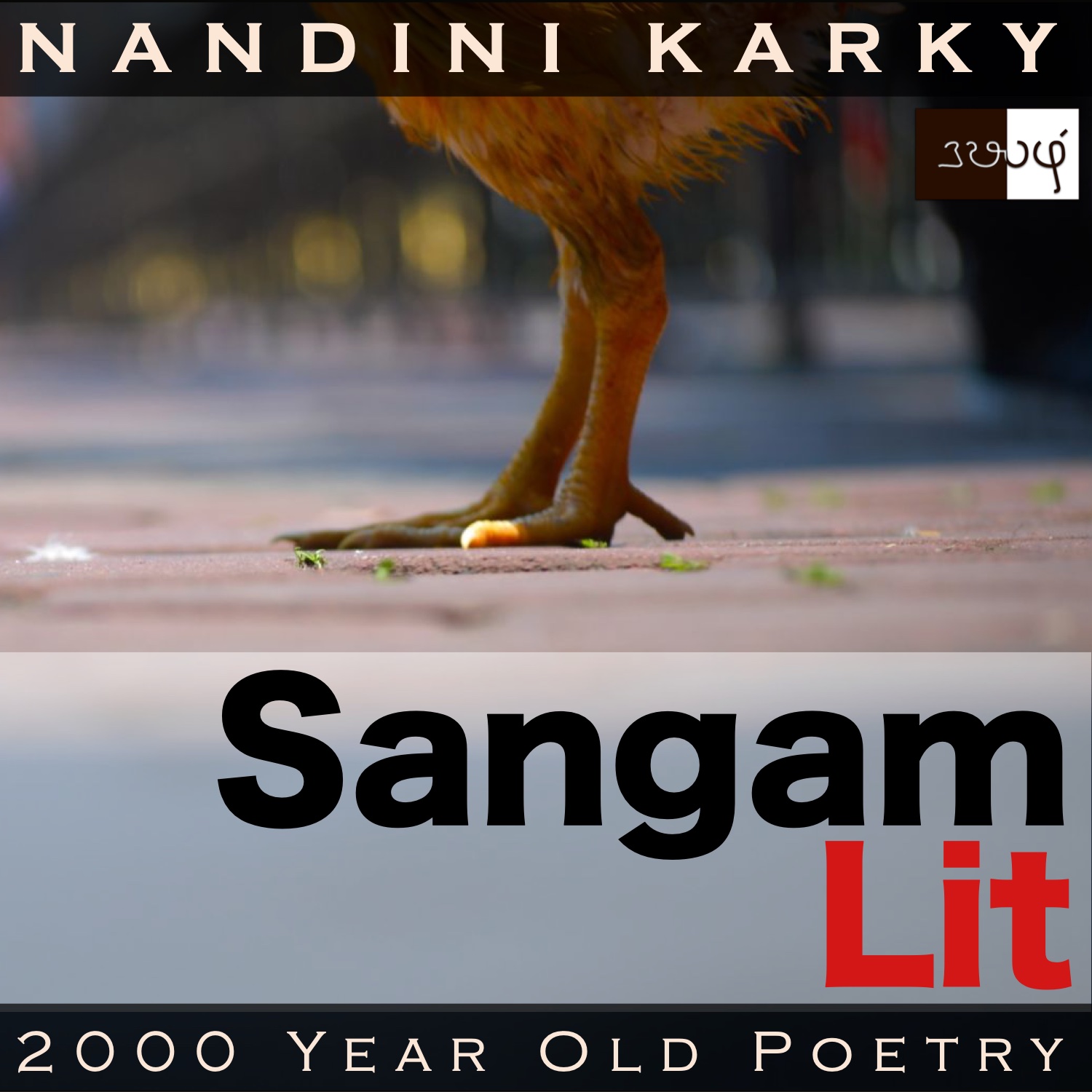Podcast: Play in new window | Download
Subscribe: Apple Podcasts | Spotify | Amazon Music | Android | iHeartRadio | TuneIn | RSS | More

In this episode, we observe changes in nature and its effect on inner lives, as portrayed in Sangam Literary work, Natrinai 389, penned by Kaveripoompattinathu Senkannanaar. Set in the mountains of ‘Kurinji’, the verse speaks in the voice of the confidante to the lady, passing on a subtle message to the man, listening nearby.
வேங்கையும் புலி ஈன்றன; அருவியும்
தேம் படு நெடு வரை மணியின் மானும்;
அன்னையும் அமர்ந்து நோக்கினளே, என்னையும்-
களிற்று முகம் திறந்த கல்லா விழுத் தொடை
ஏவல் இளையரொடு மா வழிப்பட்டென,
”சிறு கிளி முரணிய பெருங் குரல் ஏனல்
காவல் நீ” என்றோளே; சேவலொடு
சிலம்பின் போகிய சிதர் கால் வாரணம்
முதைச் சுவல் கிளைத்த பூழி, மிகப் பல
நன் பொன் இமைக்கும் நாடனொடு
அன்புறு காமம் அமைக நம் தொடர்பே.
The verse opens with the striking words – ‘வேங்கையும் புலி ஈன்றன’! This phrase would be curious to a contemporary speaker because both the words ‘வேங்கை’ and ‘புலி’ refer to a ‘tiger’ in current-day lingo, whereas in the verse, the word ‘வேங்கை’ refers to ‘an Indian Kino tree’. So, the opening phrase seems to say, ‘the Kino tree has given birth to a tiger’. Let’s savour this line now and delve into its meaning shortly. ‘மணியின் மானும்’ talks about ‘shining sapphires’, a frequently mentioned simile in Sangam Literature to refer to the dark richness of elements. The word ‘அன்னையும்’ and the similar-sounding ‘என்னையும்’ refers to ‘mother’ and ‘father’. Note how the latter word combines the words ‘என்’ meaning ‘my’ and ‘ஐ’ meaning ‘father’ to render that rhythmic harmony. ‘வாரணம்’ in the phrase ‘சிதர் கால் வாரணம்’ refers to ‘a hen’ rather than its other popular meaning ‘elephant’, as clarified by the adjective ‘சிதர் கால்’ or ‘clawing feet’, as well as a reference to its mate ‘சேவல்’ or ‘cockerel’. In addition to the sapphires we saw earlier, we glimpse at ‘glittering fine gold’ in ‘நன் பொன் இமைக்கும்’. Ending with ‘நம் தொடர்பே’ meaning ‘our relationship’, the verse invites us to know more!
The man and lady had been leading a love relationship and the man had been trysting with the lady by day. One day, observing the man arriving at the trysting spot, the confidante, pretending not to notice him but making sure he’s listening, turns to the lady and says, “The ‘vengai’ tree has birthed tiger cubs; Those cascades shine akin to sapphires in the honey-rich, tall mountains; Mother is casting a pointed look as well; Father has gone tracking an animal, with unlearnt young helpers, who wield arrows that can pierce an elephant’s face. Mother had said, “Guard those tall-stalked millets fields from those raiding little parrots!” The strong-clawed hen along with its mate digs up dust in the ancient field and makes fine gold dust glimmer in the lord’s mountain country. What would happen to your loving relationship with him now?” With these words, the confidante subtly points to the man, the changes in the world outside, and nudges him to seek the lady’s hand in marriage.
Now, for the hidden nuances! The confidante opens with a bang, talking about ‘vengai’ trees yielding tiger cubs. Here’s an interwoven plant-animal connection, and to unravel its meaning, we need to recollect a previous Natrinai verse, which talks about how the flowers of this tree look like tiger cubs. And so, these words are a compaction of that simile to say that the tree has flowered. Let’s hold on to that image of a ‘vengai’ tree bursting with its bright yellow flowers and listen to the rest of what the confidante says. From the trees, she turns to talk about the waterfalls in the mountains glimmering like sapphires. At this point, the confidante turns from the world outside to mother’s meaning-filled look at her. Next, it is father’s turn to appear in the conversation and the confidante talks about how he has gone hunting for an animal with helpers, who know nothing but the skill of archery, which they perform with a high level of expertise, so high that they can pierce the face of an elephant. Then, she reflects on how mother had given them the task of guarding the millet fields from those parrots and it was at this time, the lady had trysted with the man, furthering their love relationship. When describing the man’s mountain country, the confidante talks about how when a hen and its mate dig up the old soil in his land, gold dust seems to shine therein. The confidante finishes by wondering what would happen to that relationship now.
What could be the trouble? Why the worry in the confidante’s heart? To understand this, we have to travel back to the first line of the verse, which talks about the flowering of the ‘vengai’. To those ancients, this signifies both the arrival of the harvest season as well as the time for marriage. It is for this reason mother seems to be pointedly looking at her daughter and her friend. The urgency of the situation is also emphasised by the fact that father has gone hunting now, and the moment he returns, the harvesting of the crops shall begin, which would sound the death knell to the man’s trysting with the lady in the millet fields. In that reference of how a digging hen finds gold dust in the man’s mountain country, the confidante places a hidden admonishment to him saying that even though he has so much wealth, he seems not interested in offering that to the lady’s parents and seeking the lady’s hand in marriage. Although it is only marriage that shines in these Sangam minds, they leave behind rich references to the trees, animals and life then. One such striking element is the poetic rendering of how the people, who lived in the ancient mountain country then, seemed to be equally at ease being hunters as well as farmers, as illustrated by this Sangam verse on relationships!




Share your thoughts...